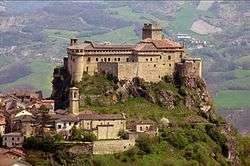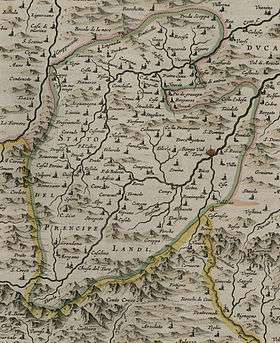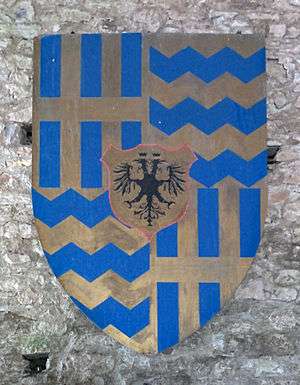Landi family
| Landi | |
|---|---|
| noble family | |
|
The Landi arms in the entrance to the Castle of Bardi | |
| Country |
Holy Roman Empire Papal States |
| Estates |
|
| Founder | Rodolfo Landi |
| Ethnicity | Italian |
The Landi were a noble family from Piacenza, now in Reggio-Emilia, in central Italy. From 1551 to 1582, they were princes of the Val di Taro, now in the province of Parma, at that time in papal territory.[1] Their principality is sometimes called Lo Stato Landi ("the Landi state"); although the term is not well known, there is substantial documentation of it in the Archivio Segreto Vaticano, in the Vatican City.[2]
History



The Landi were a feudal family from the area of Piacenza; they may have originated in Bobbio. They are thought to have descended from one Rodolfo Landi; however, it has also been suggested that they were descendants of an ancestor named Lando or Orlando.[1] The family divided into several lines, of which the most notable is that of Compiano, which descended from Giannone Landi, a great-grandson of Rodolfo.[1]
From mediaeval times, most of the Val di Taro was held by the Landi family. In 1582, their lands passed into the hands of Ottavio Farnese, Duke of Parma, following a failed conspiracy against the Farnese family, some thirty years before the better-known Sanvitale conspiracy. Claudio Landi, Prince of Val di Taro, plotted with Giambattista Anguissola and Giammaria and Cammillo Scotti to assassinate Farnese, but the plot was discovered; Landi lost the Val di Taro, and the other conspirators were executed.[3] Landi was stripped of his titles and his feudal status in 1578 and condemned to death in 1580. However, as a prince of the Holy Roman Empire, he was not subject to the judgement of ordinary courts. He was pardoned on 27 September 1583 by the emperor Rudolf II, who also ordered Landi's confiscated lands returned to him; they were not.[4]
His daughter, Maria Landi, married Ercole Grimaldi, Lord of Monaco, on 15 September 1595.[5]:54 After Lord Ercole was assassinated in 1604, Maria's brother, Federico Landi, became guardian of her son Honoré, then six years old, and regent of Monaco.[5]:54[6]
References
- 1 2 3 Natale Carotti (1933). Landi (in Italian). Enciclopedia Italiana. Roma: Istituto dell’Enciclopedia Italiana. Accessed September 2015.
- ↑ Antonio Samorè (1979). Lo Stato Landi in documenti dell'Archivio Segreto Vaticano (in Italian); in: Erwin Gatz (ed.) (1979). Römische Kurie. Kirchliche Finanzen. Vatikanisches Archiv: Studien zu Ehren von Hermann Hoberg (festschrift for Hermann Hoberg). Miscellanea Historiae Pontificiae 45: 1–36. Rome: Università Gregoriana Editrice.
- ↑ [s.n.] (1863) Barbara Sanvitale e la congiura del 1611 contro i Farnesi; Cenni storici, di Federico Odorici, con documenti. Volumetto di pag. 84, in 8.° (book review, in Italian). Archivio Storico Italiano, Firenze: G.P. Vieusseux. Nuova serie 17 (1): 100–106. Accessed September 2015.
- ↑ Cornelia Bevilacqua (2004). Landi, Claudio (in Italian). Dizionario Biografico degli Italiani, volume 63. Roma: Istituto dell’Enciclopedia Italiana. Accessed September 2015.
- 1 2 Mauro Lucco (2000). A New Portrait by Raphael and Its Historical Context. Artibus et Historiae 21 (41): 49–73. (subscription required)
- ↑ Onorato II Grimaldi principe di Monaco (in Italian). Enciclopedie On Line. Roma: Istituto dell’Enciclopedia Italiana. Accessed September 2015.
Further reading
- "LANDI, Ubertino". Enciclopedia (in Italian). Treccani. Retrieved 17 November 2014.
- "LANDI, Fredrico". Enciclopedia (in Italian). Treccani. Retrieved 3 December 2014.
- "LANDI, Manfrado III". Enciclopedia (in Italian). Treccani. Retrieved 3 December 2014.
